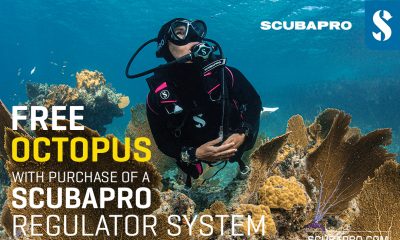Marine Life & Conservation
Researchers Claim Dissolving Snail Shells Are An Effect of Ocean Acidification

An increasingly acidified Pacific Ocean is dissolving the shells of tiny marine snails that live along North America’s western coast. The broad finding, which has surprised some researchers, suggests that sea life is already being affected by changes in the ocean’s chemistry caused by rising carbon dioxide levels in the atmosphere.
“It really changes the game by demonstrating that acidification is having a noticeable impact,” says biological oceanographer Jan Newton, co-director of the Washington Ocean Acidification Center at the University of Washington, Seattle. Newton was not involved in the study.
The researchers studied one kind of pteropod, common planktonic snails known as sea butterflies for the winglike body parts that help them glide through the water. Like other shellfish, pteropods use dissolved carbonate in seawater to build their shells. But laboratory studies have shown that the process can be disrupted, and shells can dissolve as seawater becomes more acidic, or lower in pH (temperature has an impact, too). As its concentration rises in the atmosphere, carbon enters the ocean through chemical reactions, causing its pH at the surface to drop by 0.1 units since the pre-industrial era. That’s raised fears that marine ecosystems could be affected.
Outside the laboratory, however, just a handful of studies have linked falling pH levels to damaged shells. In 2012, researchers documented damage to oysters in hatchery tanks in Oregon fed with seawater that had become more acidic as a result of offshore upwelling patterns. The same year, researchers reported that pteropods collected at one site in the Southern Ocean around Antarctica showed signs of shell damage.
To gauge how acidification might be affecting the Pacific, biological oceanographer Nina Bednaršek of the National Oceanic and Atmospheric Administration (NOAA) in Seattle and colleagues collected pteropods at 13 sites during a 2011 research cruise between Washington and southern California. Back at the lab, they used a scanning electron microscope to examine the fragile shells, which are 1 cm in size or smaller. Normally, healthy pteropods have smooth shells. But more than one-half of these shells showed signs of dissolution, they report in the Proceedings of the Royal Society B. The pitted textures made them look like “cauliflower” or “sandpaper,” Bednaršek says.
“I was surprised by the sheer spacial extent of the dissolution,” she says. “This is something we have not predicted before – the extent of the population that’s already affected.”
What’s not clear from this study is how such damage might be affecting pteropod populations or the broader ecosystem. Previous work has suggested that shell damage can make it harder for the invertebrates to fight infection, maintain metabolic chemistry, defend themselves against predators, and control buoyancy. And while the snails are one of the most abundant organisms on Earth, “their role in ecosystems is generally not all that well known,” writes biological oceanographer Gareth Lawson of the Woods Hole Oceanographic Institution in Massachusetts in an e-mail. But “they can be important prey items at some times and places” for fish and other creatures. For example, the pteropod examined in this study, Limacina helicina, is a key food for fish eaten by pink salmon, an important North Pacific fishery.
“If the pteropod shells are dissolving as fast as the authors claim, the effects on individual physiology, behavior, and fitness, and hence on populations and food webs, are not easy to predict,” Lawson says. “But they could be profound.”
The waters probed during this study, known as the California Current, are a hot spot of ocean acidification because of coastal upwelling, which brings naturally acidic waters to the surface, where they are made even more acidic by greenhouse gas pollution. But Richard Feely of NOAA, a co-author on the study, says that the site serves as a “harbinger” for what global seas will be experiencing decades hence.
Marine Life & Conservation
Double Bubble for Basking Sharks

 The Shark Trust is excited to announce that, for two more days only, all donations, large or small, will be doubled in the Big Give Green Match Fund!
The Shark Trust is excited to announce that, for two more days only, all donations, large or small, will be doubled in the Big Give Green Match Fund!
Donate to Basking in Nature: Sighting Giants
The Shark Trust is hoping to raise £10k which will be doubled to £20k. This will go towards Basking in Nature: Sighting Giants. And they need YOUR help to reach they’re goal.
The Shark Trust’s citizen science project is to monitor and assess basking sharks through sightings; encouraging data collection, community engagement, and promoting nature accessibility. This initiative aims to enhance health and wellbeing by fostering a deeper connection with British Sharks.
Campaign Aims
- Increase citizen science reporting of Basking Sharks and other shark sightings to help inform shark and ray conservation.
- Provide educational talks about the diverse range of sharks and rays in British waters and accessible identification guides!
- Create engaging and fun information panels on how to ID the amazing sharks and rays we have on our doorstep! These can be used on coastal paths around the Southwest. With activities and information on how you can make a difference for sharks and rays!
- Promote mental wellbeing through increasing time in nature and discovering the wonders beneath the waves!
Donate, and double your impact. Click Here
Marine Life & Conservation
Leading UK-based shark conservation charity, the Shark Trust, is delighted to announce tour operator Diverse Travel as a Corporate Patron

 Corporate Patrons provide a valuable boost to the work of The Shark Trust. The Trust team works globally to safeguard the future of sharks, and their close cousins, the skates and rays, engaging with a global network of scientists, policymakers, conservation professionals, businesses and supporters to further shark conservation.
Corporate Patrons provide a valuable boost to the work of The Shark Trust. The Trust team works globally to safeguard the future of sharks, and their close cousins, the skates and rays, engaging with a global network of scientists, policymakers, conservation professionals, businesses and supporters to further shark conservation.
Specialist tour operator Diverse Travel has operated since 2014 and is committed to offering its guests high quality, sustainable scuba diving holidays worldwide. Working together with the Shark Trust will enable both organisations to widen engagement and encourage divers and snorkellers to actively get involved in shark conservation.
“Sharks are truly at the heart of every diver and at Diverse Travel, we absolutely share that passion. There is nothing like seeing a shark in the wild – it’s a moment that stays with you forever!” says Holly Bredin, Sales & Marketing Manager, Diverse Travel.
“We’re delighted to celebrate our 10th year of business by becoming a Corporate Patron of the Shark Trust. This is an exciting partnership for Diverse and our guests. We will be donating on behalf of every person who books a holiday with us to contribute towards their vital shark conservation initiatives around the world. We will also be working together with the Trust to inspire divers, snorkellers and other travellers to take an active role – at home and abroad – in citizen science projects and other activities.”
Paul Cox, CEO of The Shark Trust, said:
“It’s an exciting partnership and we’re thrilled to be working with Diverse Travel to enable more divers and travellers to get involved with sharks and shark conservation. Sharks face considerable conservation challenges but, through collaboration and collective action, we can secure a brighter future for sharks and their ocean home. This new partnership takes us one more valuable step towards that goal.”
For more information about the Shark Trust visit their website here.
For more about Diverse Travel click here.
-

 News3 months ago
News3 months agoHone your underwater photography skills with Alphamarine Photography at Red Sea Diving Safari in March
-

 News3 months ago
News3 months agoCapturing Critters in Lembeh Underwater Photography Workshop 2024: Event Roundup
-

 Marine Life & Conservation Blogs3 months ago
Marine Life & Conservation Blogs3 months agoCreature Feature: Swell Sharks
-

 Blogs2 months ago
Blogs2 months agoMurex Resorts: Passport to Paradise!
-

 Blogs2 months ago
Blogs2 months agoDiver Discovering Whale Skeletons Beneath Ice Judged World’s Best Underwater Photograph
-

 Gear Reviews3 weeks ago
Gear Reviews3 weeks agoGEAR REVIEW – Revolutionising Diving Comfort: The Sharkskin T2 Chillproof Suit
-

 Marine Life & Conservation2 months ago
Marine Life & Conservation2 months agoSave the Manatee Club launches brand new webcams at Silver Springs State Park, Florida
-

 Gear Reviews3 months ago
Gear Reviews3 months agoGear Review: Oceanic+ Dive Housing for iPhone


















